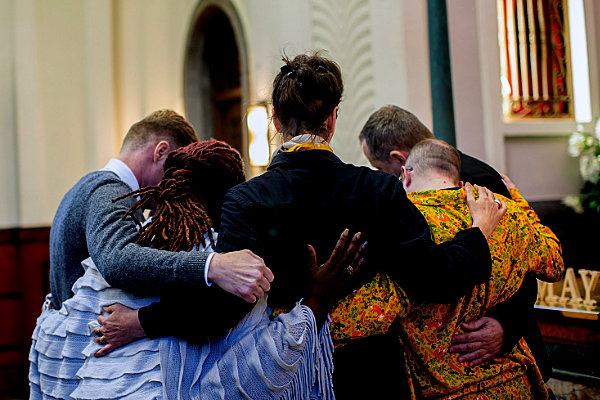 by Tim Ditman
by Tim DitmanOSF Healthcare
Country music star Tim McGraw’s “Live Like You Were Dying” tries to sum up the emotions of a terminal illness.

Pastoral Care & Bereavement Coordinator
It’s not just Hollywood. Rita Manning counsels patients and their loved ones as a pastoral care professional and bereavement coordinator for OSF HealthCare. She says there are ways to make the person’s final days more peaceful.
Getting the diagnosis
Before the “what’s next?” phase sets in, Manning says gut reactions to a terminal illness diagnosis can vary widely. Some have been in declining health, and they may show less of an emotional response. Others learn the news unexpectedly and abruptly.
“Those that are broadsided probably have more of an impact of mental and emotional things,” Manning says.
People might talk about being afraid of death or ask lots of questions. Some may want to go “full speed ahead,” as Manning puts it, and do things while they can. They may travel or catch up with old friends. Others may retreat and want to contemplate the future alone. Depression and other mental health issues can follow.
Helping out
Here’s a phrase to try when starting the conversation with a loved one:
“You may not want to talk about this now. Just know that whenever you are ready, I’m ready to listen and be there,” Manning says, putting herself in the shoes of a caregiver.
In other words, try to meet the person where they are. Don’t try to fix something that can’t be fixed. Acknowledge that the news is tough. Sit and cry with your loved one if that’s the emotion they show. Or if you don’t wear your emotions on your sleeve, offer help in other ways. Offer to mow the yard or take care of groceries.
Manning advises to avoid cliché phrases like “How are you doing?” Instead, try “How’s your day treating you?”
Another poor phrase: “You’re going to a better place.”
“Those types of phrases might be factual for them in their faith journey. It still may not be the time they want to hear that,” Manning says.
End of life discussions
It’s not uncommon for an adult with a terminal illness to put off talking about their funeral, estate and other matters once they have passed away. But there comes a time when there’s little time left to get things in order. Approach it delicately, Manning suggests.
“We just want to honor your wishes,” Manning says, again posing as a caregiver. “If you could help us understand what those are, that would help us to know how to move forward.”
Other phrases that may work: What is your greatest concern? What is your greatest hope? How can we make your final days full and comfortable?
Children and terminal illnesses
Consoling and supporting a child who will soon pass away requires a different approach, Manning says. You should still be honest, but they may not understand death. So, explain it in a way they understand.
First, reassure the child that the situation is not their fault.
Try something like: “Sometimes people just get sick. As hard as we try, we just can’t find that solution to make you well again.”
If they ask a question, an adult may need to ask one back to make sure they grasp what the child is thinking. For example: does the child’s stomach hurt because they are nervous or because of the illness? The response will shape what the adult says.

Relate to what children know, like a pet who died or even leaves falling off trees in the winter. But don’t be afraid to use words like “death” and “dying.” Using words like “lost” may cause confusion, Manning says. For example: a parent says, “We lost grandma today.” A child may respond, “Let’s go find her.”
Manning adds that there are books from trusted sources that talk about death.
“They’re still going to have questions,” Manning points out. “But it starts the hard task. Reading helps them engage and understand better.”
Learn more
Learn more about resources for people nearing the end of their life on the OSF HealthCare website.
Related articles:







 Since the outbreak of the coronavirus, visitation restrictions have been implemented in healthcare organizations, especially for patients who have tested positive for the virus. The purpose of these restrictions is to prevent the virus from spreading. Healthcare organizations do not want their COVID positive patients to infect anyone else. It makes sense to have these restrictions in place, right? After all, it seems as if it is for everyone’s protection.
These restrictions may not seem as acceptable, however, when they are applied to end-of-life COVID positive patients. Most healthcare organizations have a "two-visitor" limit for end-of-life COVID positive patients, including Penn Medicine and Tower Health. These visitors
are only allowed when death is imminent.
While this is a step up from the "no-visitor" policy that took place last year, two visitors are still not enough.
The fears of death and dying alone have been present long before COVID. The pandemic has only heightened these fears and have made them a reality for too many people.
No one should have to die without being surrounded by their loved ones, and not just two loved ones either. What if a mother is the end-of-life patient, and she has more than two children – shouldn’t they all be allowed to be there to hold her hand? If you were in the shoes of
the either the patient or a loved one, would two visitors be enough for you?
While it is true that this "two-visitor" policy is helping keep citizens physically healthy by preventing the spread of the virus, it fails to take into account the emotional and mental health of both the patients and their loved ones.
Isolation and separation can be harmful.
In fact, it is known that flexible visiting hours have the potential to reduce delirium and anxiety symptoms among patients. Patients will feel more comfortable when surrounded by loved ones, which can make for a more peaceful transition for end-of-life patients. The "two-visitor" policy also limits the ability for loved ones to "say goodbye".
A lack of a proper "goodbye" can negatively impact the emotional and mental health of those who lost their loved one, possibly even heightening their grief and mourning.
These are some reasons why there needs to be a greater number of visitors allowed for end-of-life COVID positive patients. In areas other than end-of-life, the visitation restrictions seem appropriate. While the restrictions may still be hard to follow and are not ideal, we can
understand why they are in place: to minimize the spread of COVID.
Even though the intention behind the restrictions for end-of-life patients is the same, there needs to be an exception. The right visitation policy in end-of-life situations should not be the same as the policy in all other situations.
Unfortunately, some visitation restrictions are still necessary for end-of-life patients so there is not an abundant amount of people being exposed to the virus. A possible solution, though, is to add onto the "two-visitor" policy. As long as everyone is vigilant and takes the
necessary precautions to ensure safety, then it would be okay to allow for additional visitors.
A possible policy should be for health organizations to allow the patient’s nuclear family (children and spouse) to be present. If the patient does not have a nuclear family, then his/her parents and siblings should be allowed to be present. Finally, if the patient does not have a nuclear family or parents and siblings, then he/she should be allowed to have two visitors present.
These new guidelines would allow for a greater number loved ones to be present while still being aware of exposure to the virus. Nobody wants to die without being surrounded by their loved ones, and nobody should have to.
Since the outbreak of the coronavirus, visitation restrictions have been implemented in healthcare organizations, especially for patients who have tested positive for the virus. The purpose of these restrictions is to prevent the virus from spreading. Healthcare organizations do not want their COVID positive patients to infect anyone else. It makes sense to have these restrictions in place, right? After all, it seems as if it is for everyone’s protection.
These restrictions may not seem as acceptable, however, when they are applied to end-of-life COVID positive patients. Most healthcare organizations have a "two-visitor" limit for end-of-life COVID positive patients, including Penn Medicine and Tower Health. These visitors
are only allowed when death is imminent.
While this is a step up from the "no-visitor" policy that took place last year, two visitors are still not enough.
The fears of death and dying alone have been present long before COVID. The pandemic has only heightened these fears and have made them a reality for too many people.
No one should have to die without being surrounded by their loved ones, and not just two loved ones either. What if a mother is the end-of-life patient, and she has more than two children – shouldn’t they all be allowed to be there to hold her hand? If you were in the shoes of
the either the patient or a loved one, would two visitors be enough for you?
While it is true that this "two-visitor" policy is helping keep citizens physically healthy by preventing the spread of the virus, it fails to take into account the emotional and mental health of both the patients and their loved ones.
Isolation and separation can be harmful.
In fact, it is known that flexible visiting hours have the potential to reduce delirium and anxiety symptoms among patients. Patients will feel more comfortable when surrounded by loved ones, which can make for a more peaceful transition for end-of-life patients. The "two-visitor" policy also limits the ability for loved ones to "say goodbye".
A lack of a proper "goodbye" can negatively impact the emotional and mental health of those who lost their loved one, possibly even heightening their grief and mourning.
These are some reasons why there needs to be a greater number of visitors allowed for end-of-life COVID positive patients. In areas other than end-of-life, the visitation restrictions seem appropriate. While the restrictions may still be hard to follow and are not ideal, we can
understand why they are in place: to minimize the spread of COVID.
Even though the intention behind the restrictions for end-of-life patients is the same, there needs to be an exception. The right visitation policy in end-of-life situations should not be the same as the policy in all other situations.
Unfortunately, some visitation restrictions are still necessary for end-of-life patients so there is not an abundant amount of people being exposed to the virus. A possible solution, though, is to add onto the "two-visitor" policy. As long as everyone is vigilant and takes the
necessary precautions to ensure safety, then it would be okay to allow for additional visitors.
A possible policy should be for health organizations to allow the patient’s nuclear family (children and spouse) to be present. If the patient does not have a nuclear family, then his/her parents and siblings should be allowed to be present. Finally, if the patient does not have a nuclear family or parents and siblings, then he/she should be allowed to have two visitors present.
These new guidelines would allow for a greater number loved ones to be present while still being aware of exposure to the virus. Nobody wants to die without being surrounded by their loved ones, and nobody should have to.



